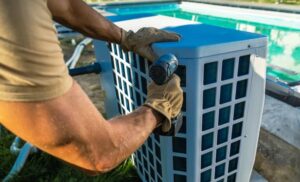Choosing the suitable pool heater is essential for maintaining a comfortable swimming pool throughout the year. Pool Heat pumps extract ambient air and transfer it to your pool water, making them ideal for warmer climates. On the other hand, gas heaters use natural gas or propane gas to quickly heat your pool, which is perfect for colder climates and outdoor pools.
Understanding the benefits and drawbacks of each heating solution is crucial. In this blog, we’ll dive into the details, comparing heat pumps vs. gas heaters, helping pool owners like you find the best option for your needs. Let’s get started to find the most energy-efficient and cost-effective way to keep your pool area warm and inviting.
Table of Contents
ToggleExploring Pool Heat Pumps: Efficient and Eco-Friendly Choices
Understanding how to efficiently and ecologically heat your pool can make all the difference in extending your swimming season without breaking the bank. Let’s dive into how pool heat pumps harness the power of nature to keep your water at the perfect temperature.
How Pool Heat Pumps Work
Pool heat pumps use a simple yet effective mechanism to regulate your pool’s temperature. They capture outside air through an evaporator coil, absorbing heat and moving it to the pool water. This method is not only effective but also energy-efficient, providing both heating and cooling capabilities to adapt to seasonal changes.
Benefits of Pool Heat Pumps
Switching to a pool heat pump offers several enticing advantages:
- Energy Efficiency: Heat pumps require less energy to operate, leading to lower annual operating costs.
- Environmental Impact: These systems utilize electricity instead of fossil fuels, significantly reducing your carbon footprint.
- Cost Savings: The initial higher upfront cost is offset by significant reductions in monthly energy bills over time.
Best Climates for Pool Heat Pumps
Heat pumps are ideal for:
- Mild to Moderate Climates: States like California, Florida, and Georgia benefit immensely from heat pumps due to their warmer weather.
- Areas with Less Severe Winters: Locations without extreme cold allow heat pumps to operate most efficiently, avoiding the high costs associated with heating from colder air.
Whether you’re lounging in the summer heat or enjoying a mild winter swim, a properly chosen heat pump can provide year-round enjoyment with an eco-conscious peace of mind.
Unveiling the Power of Gas Pool Heaters
Exploring the best heating solutions for your pool? Understanding the robust functionality of gas pool heaters will clarify why they might be the right choice, especially in certain climates.
How Gas Pool Heaters Work
Gas pool heaters operate through a combustion process, where they burn either natural gas or propane to produce heat. This heat is then efficiently transferred to the pool water, rapidly increasing water temperature. This system is especially effective because it:
- Provides rapid heating capability, warming pool water quickly regardless of outside air temperatures.
- Ensures consistent water temperatures even during colder weather, ideal for locations with variable climates.
Benefits of Gas Pool Heaters
Choosing a gas heater for your pool comes with significant advantages:
- Fast Heating: They heat the pool quicker than electric heat pumps, making them perfect for last-minute use.
- Performance in Colder Climates: Gas heaters perform optimally in colder settings where electric pumps might struggle.
These features make gas heaters an attractive option for pool owners looking for efficiency and quick heating.
Best Climates for Gas Pool Heaters
Gas heaters are particularly suited for:
- Regions with Harsh Winters: States like Minnesota, Michigan, and Colorado, where temperatures drop significantly, benefit greatly from the robust heating provided by gas heaters.
- Quick Heat-up Needs: For those spontaneous swim plans or when quick temperature adjustments are needed, gas heaters are unmatched in performance.
Whether you’re gearing up for a quick winter dip or regular swims despite the chill, a gas pool heater could be your go-to choice for maintaining an inviting and warm pool.
Cost Comparison
Let’s compare the costs of gas pool heaters and heat pumps to see which is more budget-friendly for your needs.
Initial Costs
When it comes to setting up your heating system, there are two main costs to consider:
- Installation expenses: Installing a gas line or ensuring your gas units are properly set up can add to the upfront costs, especially if a gas line needs to be installed.
- Equipment costs: Whether you choose a propane heater or an electric heat pump, the initial purchase cost can vary greatly based on the model and its capabilities.
Operational Costs
Day-to-day running costs can add up:
- Energy consumption: Gas heaters use more energy than heat pumps, which can affect your monthly bills, especially when gas meters run during the peak swimming season.
- Maintenance expenses: Regular upkeep, which includes checking gas lines and maintaining propane units, is crucial for safety and efficiency, potentially adding to the operational costs.
Long-term Savings
Looking at the bigger picture:
- Potential savings over time: Although heat pumps have a higher upfront cost, they generally consume less energy and can lead to lower annual operating costs.
- Impact of energy prices: The cost of propane or natural gas can fluctuate, impacting long-term expenses, whereas heat pumps rely on electricity, which might offer more stable pricing depending on your location.
Choosing the right pool heater involves considering both immediate and long-term financial commitments.
Seek Expert Guidance to Choose the Ideal Pool Heater

We’ve explored the benefits and drawbacks of both pool heat pumps and gas pool heaters. Now, it’s time for you to make an informed choice that suits your specific needs. Remember, while heat pumps offer energy efficiency and environmental benefits, gas heaters provide quick heating in colder climates.
If you’re still unsure about which option to choose, don’t hesitate to consult with Professional Aquatic Services. They can make customized advice based on your pool’s size, climate, and heating needs, ensuring you get the most effective and economical solution. Making the right decision now can lead to years of comfortable, cost-effective pool enjoyment.

